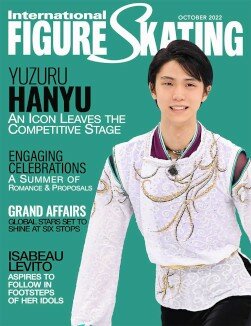IFS APRIL 2018: Our special Olympic issue will be available on newsstands in the U.S. and Canada starting April 10. To order this issue or a subscription to International Figure Skating, click HERE.

He came, he skated, he conquered. It was a huge risk, turning up at the Olympic Winter Games to defend his title after not having competed for three months.
But Yuzuru Hanyu, never one to back down from a challenge, came prepared.
It took just two and a half minutes for any doubts about his physical condition to be dispelled, as he delivered yet another brilliant display of unrivaled determination in the short program in PyeongChang.

Tessa Virtue and Scott Moir walked away from the 2018 Winter Games as the most decorated Olympic figure skaters of all time. The Canadian ice dance duo now has five medals from three Olympic appearances — a trio from the individual events in 2010, 2014 and 2018, and two from the 2014 and 2018 Team Events. Three of those medals are gold, two are silver.

It was pretty much a given — barring any unforeseen circumstances — the battle for Olympic gold would be between Russia’s Evgenia Medvedeva and Alina Zagitova and the only medal up for grabs would be the bronze. That turned out to be the reality in PyeongChang.

Savchenko and Massot are the first pairs team in 66 years to win Olympic gold for Germany, since Ria Baran and Paul Falk in 1952.

Ten nations qualified for the Team Event in PyeongChang. As in 2014, Canada, Olympic Athletes from Russia and the United States were favored to capture the medals, but this year the door opened to two nations (Israel and South Korea) that did not qualify four years earlier. Japan, China, Italy, France and Germany rounded out the top 10.
 The North Korean Olympic team had their own cheerleading squad in PyeongChang, which added to the atmosphere and energy in the figure skating venue. The aquarium at the Main Press Centre in the Mountain Cluster featured mechanical fish — not real ones.
The North Korean Olympic team had their own cheerleading squad in PyeongChang, which added to the atmosphere and energy in the figure skating venue. The aquarium at the Main Press Centre in the Mountain Cluster featured mechanical fish — not real ones.






